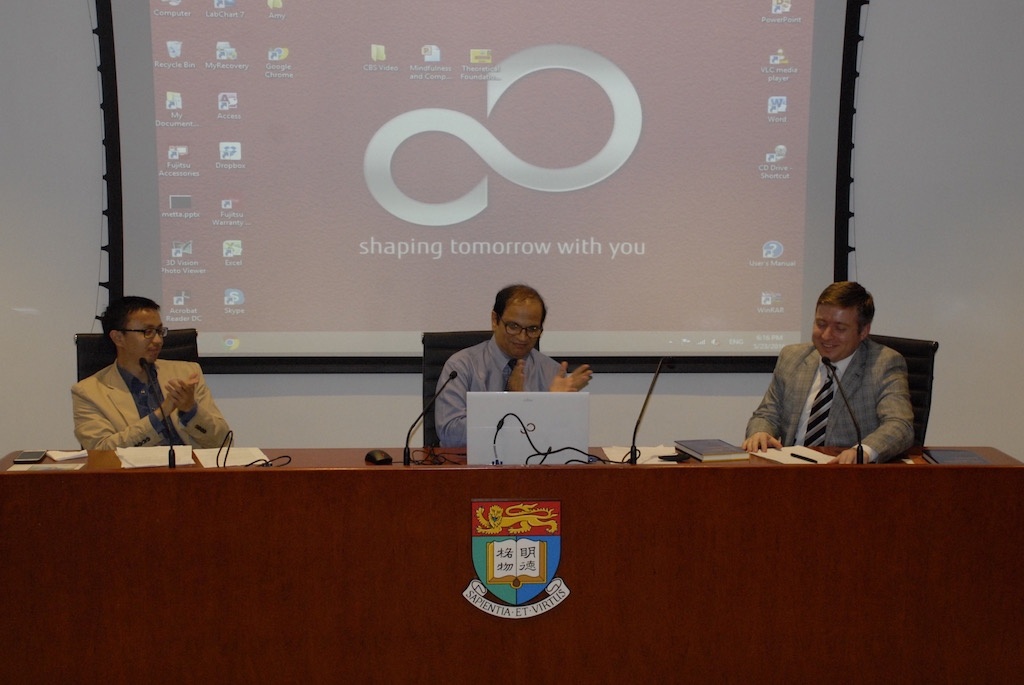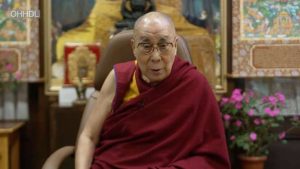
On 23 May at The University of Hong Kong, on behalf of Buddhistdoor I participated in a panel discussion on the theme of Buddhist-Islamic dialogue with Imtiaz Yusuf, an Islamic professor of comparative religion. Dr. Yusuf is a senior fellow at the Prince Alwaleed bin Talal Center for Muslim-Christian Understanding at Georgetown University, Washington, DC and director of the Center for Buddhist-Muslim Understanding at the College of Religious Studies at Mahidol University, Bangkok. He has spent much of his professional career contesting the stereotypes and presuppositions that prevent Muslims from understanding Buddhists—and vice versa. Our discussion covered many subjects, but centered on a chapter he wrote for TheWiley-Blackwell Companion to Interreligious Dialogue (2013), “Islam and Buddhism.”
Buddhist-Islamic dialogue is critical on many different levels: morally and spiritually, but also practically and even politically. Islam is the second largest religion in the world and has had a far-reaching impact on world civilization. It transformed what we know today as the Middle East and influenced Europe profoundly through both its own philosophy and its stewardship of classical Greek works. It is entwined with modern geopolitics and social issues in ways that we are only beginning to comprehend.
Buddhism, meanwhile, is part and parcel of the cultures of some of the most important countries in the modern world. Buddhism has shared the Silk Road with Islam ever since the latter’s inception. It also poses a challenge to Islam that its Abrahamic sisters, Judaism and Christianity, do not. How can Muslims relate to a non-theistic religion that does not believe in a permanent self yet is punching far above its weight in shaping civilizations across Eurasia?
Three basic rules must be determined if interfaith dialogue is to be conducted on the basis of goodwill and trust. The first is that dialogue must be distinguished from proselytization. Dialogue is all about conversation, while proselytization is about conversion. The objective of dialogue for a participant is simply, “How can I listen to and absorb the experience of the other in order to be a better Buddhist or Muslim?” There is zero impetus to conversion.
The second rule is not to “Buddhicize” Islam, to “Islamicize” Buddhism, or even to declare them “rivers” of the same “ocean.” This often well-intended dismissal of theological divergences can lead to intolerance of diversity in itself.
The third rule is that Buddhists and Muslims, while embracing each other’s differences, need to go one step further and come up with new language and discourse that can bridge those differences. Once authentic trust and goodwill are in place, we are actually free to be more adventurous (since we have established that no one is trying to convert the other) by engaging in comparative theology and exploring how the other religion’s texts “speak” to our spiritual instincts.

This also involves endeavoring to leave presuppositions at the door for the sake of absorbing each other’s wisdom. Too often, I have seen my Muslim brothers and sisters enter a conversation on the assumption that a religion must be theistic, conceiving necessarily of a supreme being in line with Abrahamic thought. In the context of an interfaith dialogue, confessional concepts like Muhammad as the final prophet of human history simply will not compute for Buddhists, who believe in a cyclical universe. Buddhists need to meet Muslims halfway and seriously entertain how Tawhid (the Islamic idea of the indivisible oneness of God) helps Muslims glimpse the transcendent in the same way that the concept of the Buddha’s trikaya (three-body theory) does for Buddhists. Buddhists should, even if just as a thought exercise, entertain whether the Sufi vision of fitra (which exhorts Muslims to restore within themselves a primordial state of closeness to God by transcending the self) could well be a kind of “Arabian samadhi.”
For more than a decade in academia, Dr. Yusuf had proposed that “paradigms drawn from religious phenomena can serve as mediums for understanding and dialogue between these two religions and their societies. The Buddha and Muhammad are charismatic personalities, enlightened and blessed in religious ways, and worthy models for their communities thus offering a bridge for Muslim–Buddhist dialogue” (Yusuf 2013, 371). This phenomenological “gleaning of meaning” runs a lesser risk of distorting doctrines while opening up avenues of commonality.
He wrote in his paper—and quite rightly—that, “Islamic-Buddhist dialogue need not stumble in any final way over fundamental differences in theistic perspective, particularly if the broader and more flexible concept of ultimate reality, interpreted as personal or non-personal, is used” (Yusuf 2013, 366). The countless Buddhas of the Buddhist vision can happily coexist with God as a principle of supreme axiological value. Here, further possibilities of shared rubrics arise, such as the prophetic dimensions of the Buddha and Muhammad (pp. 364–66), the shared status of the Buddha and Muhammad as “founders of a religious tradition,” and the two spiritual leaders’ “idealized” statuses as bodhisattva and al-insan al-kamil.
This is not to say that we make things up or change the teachings of either tradition to make the other party happy.* Rather, I would follow the principle of Nostra aetate (1965), in which the Catholic Church effectively revised the question of “whether non-Catholics are saved?” to “how are they saved?”** This reframing or realignment allows us to cautiously seek more overlapping concepts in Islam and Buddhism.
There is also the question of history. It is easy to underestimate the extent to which our appreciation of history, or our lack of it, contributes to a great deal of stereotyping and preconception. The stories and lessons we tell each other matter. If they are rich, nuanced, and sophisticated, they will reflect the way we deal with other people. If our narratives are simplistic, divisive, and prejudiced, we will behave in exactly that way toward others. On the Buddhist side, one misconception is the idea that Muslims were responsible for the demise of Buddhism in India. This is an incorrect trope that it is important to stop repeating as it saddles Muslims with a historical responsibility that is not theirs to bear.***
In the panel discussion in Hong Kong, the audience shared with Dr. Yusuf and myself concerns that interfaith dialogue was not attracting the attention of the majority of Muslims or Buddhists in the Middle East or Southeast Asia. Our response was at once easy and difficult: historical sensitivity must extend to the present and future so that contemporary stereotypes can be abandoned. Only then will an increasing number of people possess the goodwill and intellectual tools to discuss the difficult subject of comparative religion. Muslims and Buddhists also need to welcome each other into their hearts, so that each may discover the riches within.
* Theology in the broad sense, of interpreting religious doctrine, is the study of the truth that has already been revealed or encountered in human history, and the interpretation of that truth in a relevant way for contemporary society.
** For the full text, please access the Vatican’s website: http://www.vatican.va/archive/hist_councils/ii_vatican_council/documents/vat-ii_decl_19651028_nostra-aetate_en.html.
*** Far more compelling reasons exist for the collapse of institutional Buddhism in India, and these reasons have been analyzed in Ronald Davidson’s Indian Esoteric Buddhism: A Social History of the Tantric Movement (2002) and Johan Elverskog’s Buddhism and Islam on the Silk Road (2010).
References
Yusuf, Imtiaz. 2013. “Islam and Buddhism.” In The Wiley-Blackwell Companion to Inter-Religious Dialogue, First Edition, edited by Catherine Cornille, 360—75. West Sussex: John Wiley & Sons, Ltd.












